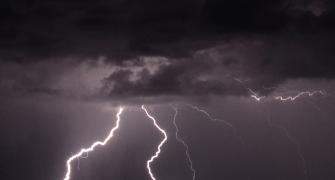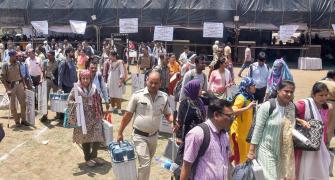 The official India Meteorological Department (IMD) and the private Skymet Weather Services have made widely divergent monsoon forecasts.
The official India Meteorological Department (IMD) and the private Skymet Weather Services have made widely divergent monsoon forecasts.
The IMD has said rainfall could be below normal at 93 per cent of the 50-year average and Skymet expects it to be excess at 102 per cent of the long-period average.
Skymet has not revised its forecast despite a strengthening El Niño, a warming of the Pacific Ocean that upsets weather patterns across the globe.
"I am sticking my neck out with the forecast," said Jatin Singh, chief executive officer of Skymet, adding the agency's research and recent record gave him the confidence to take on the IMD.
Skymet started operations in 2003 providing weather information and has grown into a weather solutions company.
The bulk of its Rs 30 crore (Rs 300 million) annual revenue comes from the insurance business, but it is building a reputation as a credible forecaster of short- and long-range weather, broken down to the city level.
The backbone of Skymet's forecasting is a network of 2,500 weather stations and a team of 10 climatologists and meteorologists, mostly drawn from the Indian Air Force.
"For the June-September monsoon forecast, we run inputs received from the Global Telecommunication System, a pool of worldwide weather-related data, on almost 124 weather models for four months starting January to get an understanding of conditions like El Niño, Southern Oscillation and Pacific sea surface temperature," said Basanta Kumar Samla, chief scientific officer of Skymet.
The models include ones developed by the Max Planck Institute for Meteorology, Hamburg, the Center for Ocean-Land-Atmosphere Studies, and the Geophysical Fluid Dynamics Laboratory. Back calculation for the last 30 years is done to check reliability and the impact on the monsoon.
Forecasts by other agencies in Japan, Australia and Europe are also looked at. "We deduce our monsoon forecast based on all these factors and also local conditions," Samla added.
However, models referred to by IMD for its monsoon prediction are not studied as these are not publicly available.
"The IMD has its own statistical model, though it also looks at other indicators. As we do not have our own model, we analyse several weather models and take a call on which to give more weight and which to skip. This is a big difference between our method and that of the IMD," said Makarand Kulkarni, chief of statistical research at Skymet.
Singh added studies on forecasts by the IMD and Skymet over 32 years had shown rainfall was closer to the Skymet prediction in over half the times.
Skymet's record since it first started makingmonsoon forecasts in 2012 has also not been bad. (see chart)
For short- and medium-range forecasts of up to a week and a fortnight, the agency relies on its network of weather stations.
It gathers the output of existing models developed by US-based National Centre for Environmental Prediction like the Global Forecast System, Climate Forecast System and Global Ensemble Forecast System and runs them on a mesoscale (small scale).
The downscaling helps in breaking down coarse resolution data into high resolution.
The new mesoscale model, termed Weather Research Forecasting, is customised for Indian needs. Inputs received from 2,500 weather stations are then injected into the model and also independently studied.
The result is collected for three consecutive days, after which a forecast for the next seven days is made.
The forecast is finally vetted by a team of meteorologists, who also tally it with prevailing weather conditions.
As the monsoon draws closer, the coming weeks will show how correct Skymet's forecast has been.
"June rain will be good as my models show a low pressure and there should not be any impact on initial sowing," said Singh.










